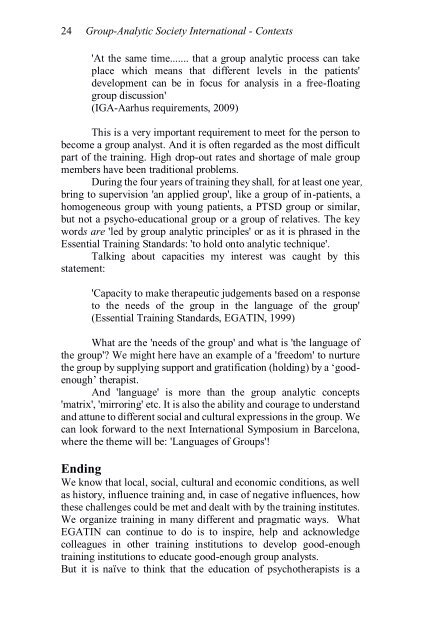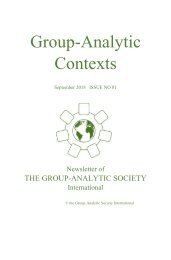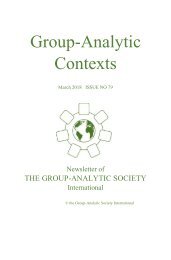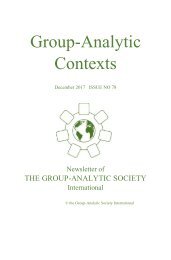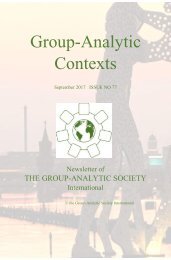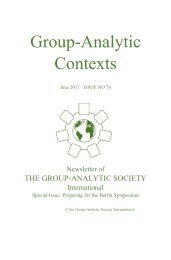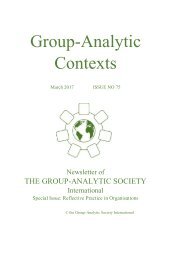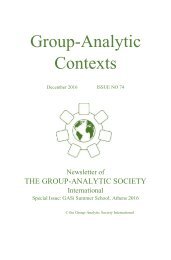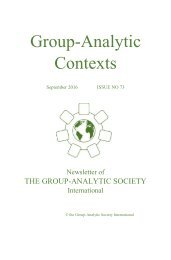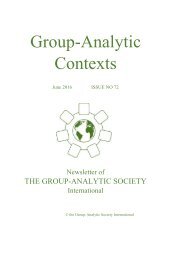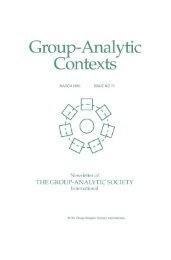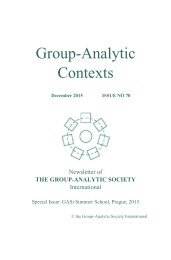Group-Analytic Contexts, Issue 80, June 2018
Create successful ePaper yourself
Turn your PDF publications into a flip-book with our unique Google optimized e-Paper software.
24 <strong>Group</strong>-<strong>Analytic</strong> Society International - <strong>Contexts</strong><br />
'At the same time....... that a group analytic process can take<br />
place which means that different levels in the patients'<br />
development can be in focus for analysis in a free-floating<br />
group discussion'<br />
(IGA-Aarhus requirements, 2009)<br />
This is a very important requirement to meet for the person to<br />
become a group analyst. And it is often regarded as the most difficult<br />
part of the training. High drop-out rates and shortage of male group<br />
members have been traditional problems.<br />
During the four years of training they shall, for at least one year,<br />
bring to supervision 'an applied group', like a group of in-patients, a<br />
homogeneous group with young patients, a PTSD group or similar,<br />
but not a psycho-educational group or a group of relatives. The key<br />
words are 'led by group analytic principles' or as it is phrased in the<br />
Essential Training Standards: 'to hold onto analytic technique'.<br />
Talking about capacities my interest was caught by this<br />
statement:<br />
'Capacity to make therapeutic judgements based on a response<br />
to the needs of the group in the language of the group'<br />
(Essential Training Standards, EGATIN, 1999)<br />
What are the 'needs of the group' and what is 'the language of<br />
the group'? We might here have an example of a 'freedom' to nurture<br />
the group by supplying support and gratification (holding) by a ‘goodenough’<br />
therapist.<br />
And 'language' is more than the group analytic concepts<br />
'matrix', 'mirroring' etc. It is also the ability and courage to understand<br />
and attune to different social and cultural expressions in the group. We<br />
can look forward to the next International Symposium in Barcelona,<br />
where the theme will be: 'Languages of <strong>Group</strong>s'!<br />
Ending<br />
We know that local, social, cultural and economic conditions, as well<br />
as history, influence training and, in case of negative influences, how<br />
these challenges could be met and dealt with by the training institutes.<br />
We organize training in many different and pragmatic ways. What<br />
EGATIN can continue to do is to inspire, help and acknowledge<br />
colleagues in other training institutions to develop good-enough<br />
training institutions to educate good-enough group analysts.<br />
But it is naïve to think that the education of psychotherapists is a


